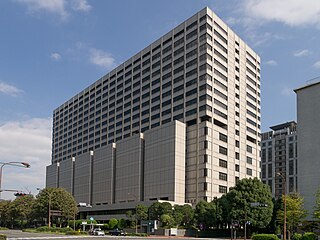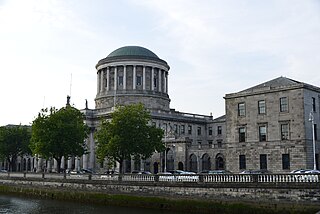
A judge is a person who presides over court proceedings, either alone or as a part of a panel of judges. In an adversarial system, the judge hears all the witnesses and any other evidence presented by the barristers or solicitors of the case, assesses the credibility and arguments of the parties, and then issues a ruling in the case based on their interpretation of the law and their own personal judgment. A judge is expected to conduct the trial impartially and, typically, in an open court.
The Courts of England and Wales, supported administratively by His Majesty's Courts and Tribunals Service, are the civil and criminal courts responsible for the administration of justice in England and Wales.
The chief justice is the presiding member of a supreme court in many countries with a justice system based on English common law, such as the Supreme Court of Nepal the High Court of Australia, the Supreme Court of Canada, the Supreme Court of Bangladesh, the Supreme Court of Ghana, the Hong Kong Court of Final Appeal, the Supreme Court of India, the Supreme Court of Ireland, the Supreme Court of Japan, the Supreme Court of Nepal, the Supreme Court of New Zealand, the Supreme Court of Nigeria, the Supreme Court of Pakistan, the Supreme Court of the Philippines, the Supreme Court of Singapore, the Supreme Court of the United States, and provincial or state supreme courts/high courts.

High court is a name for a variety of courts, often with jurisdiction over the most serious issues.

The Supreme Court of Ireland is the highest judicial authority in Ireland. It is a court of final appeal and exercises, in conjunction with the Court of Appeal and the High Court, judicial review over Acts of the Oireachtas. The Supreme Court also has appellate jurisdiction to ensure compliance with the Constitution of Ireland by governmental bodies and private citizens. It sits in the Four Courts in Dublin.

The Courts of Ireland consist of the Supreme Court, the Court of Appeal, the High Court, the Circuit Court, the District Court and the Special Criminal Court. With the exception of the Special Criminal Court, all courts exercise both civil and criminal jurisdiction, although when the High Court is exercising its criminal jurisdiction it is known as the Central Criminal Court.

The Supreme Court of the United Kingdom is the final court of appeal in the United Kingdom for all civil cases and all criminal cases originating in England, Wales and Northern Ireland, as well as some limited criminal cases from Scotland. As the United Kingdom's highest appellate court for these matters, it hears cases of the greatest public or constitutional importance affecting the whole population.

The chief justice of Ireland is the president of the Supreme Court of Ireland. The chief justice is the highest judicial office and most senior judge in Ireland. The role includes constitutional and administrative duties, in addition to taking part in ordinary judicial proceedings.
The courts of Northern Ireland are the civil and criminal courts responsible for the administration of justice in Northern Ireland: they are constituted and governed by the law of Northern Ireland.
The following are lists of justices of several national Supreme Courts:

In most legal jurisdictions, a supreme court, also known as a court of last resort, apex court, and highcourt of appeal, and court of final appeal, is the highest court within the hierarchy of courts. Broadly speaking, the decisions of a supreme court are binding on all other courts in a nation and are not subject to further review by any other court. Supreme courts typically function primarily as appellate courts, hearing appeals from decisions of lower trial courts, or from intermediate-level appellate courts. A supreme court can also, in certain circumstances, act as a court of original jurisdiction.
The judiciaries of the United Kingdom are the separate judiciaries of the three legal systems in England and Wales, Northern Ireland and Scotland. The judges of the Supreme Court of the United Kingdom, the Special Immigration Appeals Commission, Employment Tribunals, Employment Appeal Tribunal and the UK tribunals system do have a United Kingdom-wide jurisdiction but judgments only apply directly to the jurisdiction from which a case originates as the same case points and principles do not inevitably apply in the other jurisdictions. In employment law, employment tribunals and the Employment Appeal Tribunal have jurisdiction in the whole of Great Britain.
The chief justice of Hong Kong was, until 1997, the chief judge of the Court of Appeal of the Supreme Court of Hong Kong and the most senior judge in the court system.

The Court of Chancery was a court which exercised equitable jurisdiction in Ireland until its abolition as part of the reform of the court system in 1877. It was the court in which the Lord Chancellor of Ireland presided. Its final sitting place was at the Four Courts in Dublin, which still stands.
The Court of Appeal in Ireland was created by the Parliament of the United Kingdom of Great Britain and Ireland under the Supreme Court of Judicature Act (Ireland) 1877 as the final appellate court within Ireland, then under British rule. A last appeal from this court could be taken to the House of Lords in London.

Justices of the Supreme Court of the United Kingdom are the judges of the Supreme Court of the United Kingdom other than the president and the deputy president of the court. The Supreme Court is the highest court of the United Kingdom for all civil cases, and for criminal cases from the jurisdictions of England and Wales and Northern Ireland. Judges are appointed by the British monarch on the advice of the prime minister, who receives recommendations from a selection commission.
The High Court of Justice in Ireland was the court created by the Supreme Court of Judicature Act (Ireland) 1877 to replace the existing court structure in Ireland. Its creation mirrored the reform of the courts of England and Wales five years earlier under the Judicature Acts. The Act created a Supreme Court of Judicature, consisting of a High Court of Justice and a Court of Appeal.
The Court of Appeal is a court in Ireland that sits between the High Court and Supreme Court. Its jurisdiction derives from Article 34.4. It was established in 2014, taking over the existing appellate jurisdiction of the Supreme Court in 2014 and replacing the Court of Criminal Appeal and the Courts-Martial Appeal Court. Appeals to the Supreme Court are at that Court's discretion.